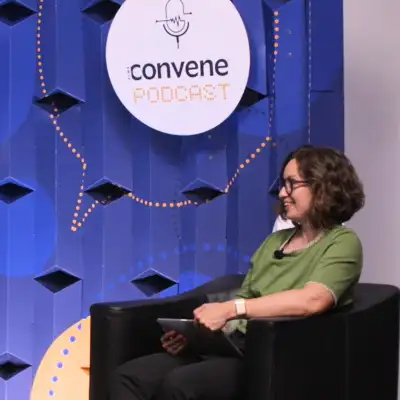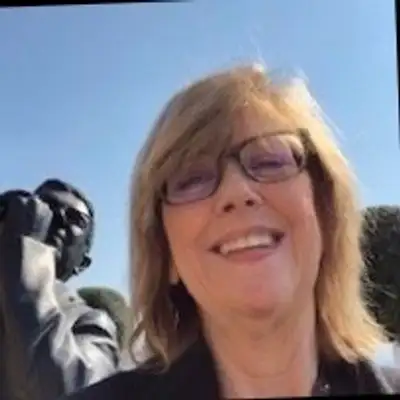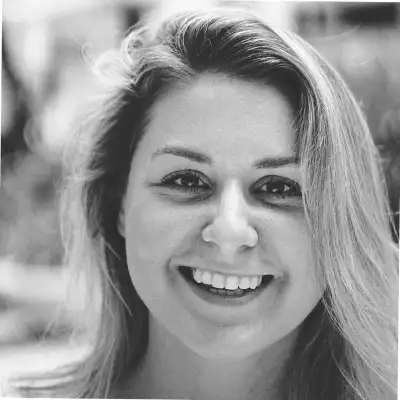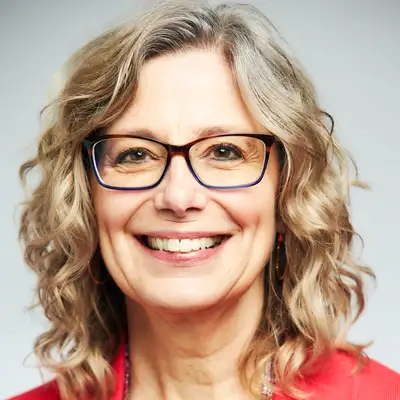Creators and Guests
What is PCMA Convene Podcast?
Since 1986, Convene has been delivering award-winning content that helps event professionals plan and execute innovative and successful events. Join the Convene editors as we dive into the latest topics of interest to — and some flying under the radar of — the business events community.
Convene Talk, ep. 63/May 16, 2025
*Note: the transcript is AI generated, excuse typos and inaccuracies
Magdalina Atanassova: This is the Convene Podcast.
Welcome to another episode of the Convene Talk.
The article that I picked for today's discussion appeared recently in News Junkie, is from Ophthalmology Times, titled When the World Went Virtual, How Ophthalmology Conferences Stayed On Track. And I picked a very complicated topic that's really hard to pronounce.
So I hope all the all the doctors in this field are not judging my pronunciation or if I'm planners working in that field.
So the author starts with this, which I feel is very fitting for us, too. So I'm quoting As the spring conference season hits its stride, it's fitting moment to reflect on how the ophthalmic medical meetings have evolved since COVID 19 first opened live events.
So the Eye Care Network asked associations like the American Academy of Ophthalmology, the American Society of Cataract and Refractive Surgery, and the American Society of Retina Specialists to look back at what changed, what stuck, and how they are preparing for the next unexpected disruption, which I feel is very is very close to us right now.
It's not very unexpected at this point in time.
But before we dive into the examples that were given by the article, I wanted to ask you actually, what stood out to you here and was there anything you didn't expect to see in that article? Barbara?
Barbara Palmer: Well, here's what stood out to me, and I will also say that ophthalmology is very hard to spell as well as to say, and when they put it in another tense, I don't, I won't, I'm not going to try that either.
What stood out to me is when the ophthalmologist meeting talked about how important it was in a virtual in an online meeting to connect participants with experts.
It just reminded me I had just read the Freeman's Trends report and it had like a really stunning statistic. It said that experts are what make the difference for people at meetings.
And this is they were looking at in person meetings.
It said access to knowledgeable staff is now the most important factor at events.
84% of the respondents to the survey said that conversations with subject matter experts are crucial. They don't want sales pitches and they don't want the kinds of information that they can find online because it's very easy to now download journal articles, people talking about different breakthroughs.
What's really hard to find are these professional experts that put things in context for you, that take these, you know, and they just put it in your specific context. So that just was like A screaming neon sign to me.
Like I was impressed that they had figured this out and offered it in an online context. And then it really resonated with the report that talked about that. Because intuitively we know that that's what happens to us when we go to meetings.
We find somebody with the same problem who shares knowledge with us about how to change it, how to solve it. So yeah, that was my takeaway. What about you? What did you see?
Magdalina Atanassova: I actually locked into a couple of different areas.
So one of the things that I really liked was related to what you said about the experts. And there was this idea of continuing the conversation areas which was something for the in person event.
But then they also had this right in the virtual setting,
which is only offered to virtual attendees, which I thought was a great idea and something the AAO is the American Academy Ophthalmology. They said that they are still offering and still very well attended.
Which I was like, yeah, I can see where's the value in that? Especially where you want to grab something quickly from a session, right? Just to have this access to a key opinion leader and ask them something that's relevant or then if you're in person to just speak with them.
I know that these were always the most attended parts of medical events when I was on that side of the business.
Jen, what do you have in mind?
Jennifer N. Dienst: Thanks. One thing that kind of caught my eye that I thought was interesting was the part about the pain point when they were in virtual mode for them seemed to be getting their attendees to connect with their exhibitors.
And they said that, you know, essentially they realized like it just wasn't going to happen. Like if the attendees were going to visit the expo online, they were going for something very specific, they weren't going to schmooze, which of course, you know, exhibitors didn't love.
So they realized that they, you know, their virtual expo really just needed to be a resource center where attendees could learn about products.
And I remember that when I was back in 2020, 2021, when we were doing a lot of stories about how organizations were, you know, doing hybrid, doing virtual only,
that was a pain point that they encountered again and again and again.
And I remember, you know, there were a few examples of solutions that they found, but from what I remember reading, I don't think that anyone really found a solve for it.
It was something that they were like, you know,
really this is where in person events win time and time again. You know, if you're an organizer and you really rely on your exhibitors and your sponsors and making sure that, you know, attendees are able to engage with them.
Like, the virtual setup just really doesn't work for that. So I thought that was interesting because I was like, yep, I remember hearing about that time and time again. Seems like it hasn't changed.
That just goes to show, like you really can't replicate an in person event,
you know, online in a lot of ways. And so that was, that was kind of interesting to me.
Magdalina Atanassova: Yeah. Remember all the work in all those fancy booths? So when you were a sponsor, you could have a smaller, bigger one virtually, which made no sense.
And there were these options for your representatives to be online to wait for people to chat with them, and nobody showed up. And these people were just hooked on online with nothing to do, which was very hard for everyone,
I feel, also on the organizer part and the association part, who want to deliver and want to, you know, show up for their sponsors and supporters, and then they couldn't do much.
Michelle, what about you?
Michelle Russell: Yeah, I think one of the things that's interesting is these are medical associations and medical associations have an advantage over some other professions in that doctors, physicians, healthcare professionals need to have continuing medical education credit.
So the, the fact that they were able to embrace online as well as in person, to me, shows that they were. You know, it's important to give access to these professionals to get their credits for education.
And they may not be able to attend in person. So it's great that they have a variety of ways for them to do that. And the other thing that struck me about the article was just that I had spoken to the executive director of the American Society for Cataract and Refractive Surgery,
who's interviewed in this story for another story that I'm working on, and that's Steve Spears.
And what's interesting is like, Barbara just talked about Freeman's research. So Freeman's research really helped them with another initiative at their annual meeting, which is that they were having trouble engaging people with their very formal kind of award ceremonies, which they did throughout the event.
And they just completely scrapped that. And they went with something a lot more informal, which was like a. They call it a tap room, which is on the exhibit floor, or, you know, adjacent to the exhibit floor.
And again, this speaks to what Barbara was talking about. It gives people a chance to talk to experts so they don't just hear somebody get an award for all of their great accomplishments.
They get to actually talk to them and learn about their career path and have, you know, very casual conversations in a more relaxed environment.
So that just struck me because I had just spoken with him. But again, just having, you know, a daughter who's in the healthcare field and is unable to travel with small children, knowing that she avails herself of education through online formats, reinforces how important it is to be able to offer that.
Magdalina Atanassova: Yeah, I think that surfaced or was very well highlighted during the pandemic.
For people that care for others or have very busy schedules,
it really opens up another door, another opportunity for them to get really good quality education online. And I think that was also the takeaway from one of the associations in this article that what they took away from this whole experience was to provide excellent education to their members in a variety of formats.
So now they saw that they really need to repurpose to capture this content and repurpose it to. To just give more to their members. Exactly. For these reasons. And another thing that I remember from that time was the difference that captions made when, you know, people are not native,
or even if there was a speaker that's not native and was speaking either very fast or very.
In a very low way, or, you know, because these are terms that are sometimes very complicated. Here we are struggling with ophthalmology and let alone their bajillions of very complicated words that they use, and now they could see them written and it made such a difference in understanding the actual content being delivered.
So that was great to see that it stayed with those medical associations.
Barbara Palmer: I was thinking about this guy named Andrew Brodsky who's written a great book called Ping about virtual communication. And one of the points that he made is that we have only been communicating virtually just a tiny little amount of time compared to the.
I think he said 10,000 years that we've been talking.
It's just these experiments that we're doing, and we're getting closer and closer to understanding what works in this context and what works in another context,
so that we have that ability to put resources into what works and not into what doesn't work. And meanwhile, like you said, the captioning, I am a person who is always going to understand something I read more fully than something I hear.
And so I put captions on with almost everything I watch online, including movies.
And so I just. That accessibility is a great point.
Magdalina Atanassova: Have you seen all these funny videos on social media with people watching a movie, reading the captions, then they turn away for a second and all they could hear is gibberish.
And then they look back and start reading and everything is clear again.
So that's how it feels. Yeah, we need to be really more mindful of that and how we can help everyone, not just those that needed.
Another thing that stood out to me was from the American Society of Retina Specialists that they said the importance of flexibility in planning was now much more highlighted into their processes.
And now they had these playbook of strategies and procedures that they learned from COVID and they could really apply quickly if something similar was to happen.
And I think that's very good point for those that might have just brushed off that time and forgotten about it.
Because in the beginning we were all scrambling and we're trying to make sense of the situation,
trying to react and why not really make this part of the, of the planning process and just have it handy.
If something similar was to happen and a few others I think reported they were now they had this opportunity to quickly switch formats if that needed to be done, which I think is very important.
And one other thing which was not related to education or the programming or planning was one of the associations reporting how they saved money by having some of their executive committee meetings moved completely online, which before that were held in person.
So they saved money on that. And they also downgraded their office spaces,
which I think is important. You don't necessarily need a fancy office.
Jennifer N. Dienst: Space, especially when everyone's working remotely nowadays anyway.
Magdalina Atanassova: Exactly. And especially if it's ran by volunteers, right?
Jennifer N. Dienst: Exactly.
Barbara Palmer: Oh, yes.
Magdalina Atanassova: So these were some very good points made by those associations. So I really like this article. It had some great points.
Barbara Palmer: It made me wonder, remember when people would send out boxes to attendees? I wonder what, you know, if some people found that that was really very effective in certain instances or that was just.
I don't know, I just like that. I just think, you know, people are great, they'll just think of things and try them out. And. And it really was in those early days, it really was a point of connection and it made me curious whether anyone had found that that was something that in certain instances and circumstances that it was good to continue that.
Let us know if that's something that you do. Any listeners?
Magdalina Atanassova: That was a good point. I had very nice cake mix delivered from Singapore.
There was an online event from Singapore Tourism Board with a popular chef, a pastry chef, and she sent out those cake mix so everybody could make a cake together with her.
It was very cool. I was like, yay, a piece of Singapore.
So I hope people are continuing that. It was very fun.
I don't know, logistics wise and also sustainability wise, how smart it is and the size of the group that you can do that. But yeah, it was a nice touch.
All right, thank you all for the discussion.
Remember to subscribe to the Convene Podcast on your favorite listening platform to stay updated with our latest episodes. For further industry insights from the Convene team, head over to PCMA.org/convene. My name is Maggie. Stay inspired. Keep inspiring. And until next time.



